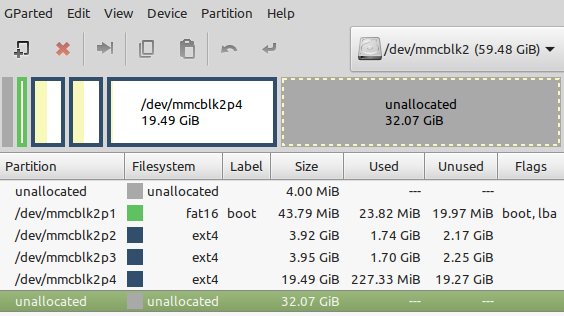I am considering making some changes to the partition and file-system in my Venus OS Large version 2.80~33-large-24. I currently have a couple of 64 Gbyte cards bought as Black Friday bargains but want to use smaller cards in the future as most of the space is wasted. Currently the rootfs ext4 file systems do not fill my partitions leaving 19.6 Gbytes unused and un-formatted in each partition whilst each actual ext4 file system already has 91% of 1.2 Gbytes occupied. I also understand that the rootfs is now read only which has a number of consequences including an inability to add packages with opkg.
I have cloned and backed up my existing system using dd on a standard Linux desktop (Mint Cinnamon flavour) and I am using gparted. I understand there are various changes made to the rootfs portion during [major] upgrades but do not understood what exactly is done or may be done in the future. Ideally I would like to reduce the two rootfs partitions and increase their file-systems to fill them allowing extra headroom for the future and possibly return them to read/write. I should then be able to clone onto a smaller microSD card whilst retaining a generous data partition.
But what will happen at the next update to such a non standard configuration? Any advice welcome.
As this is my first post I should note I have filled in my profile with some background information.

